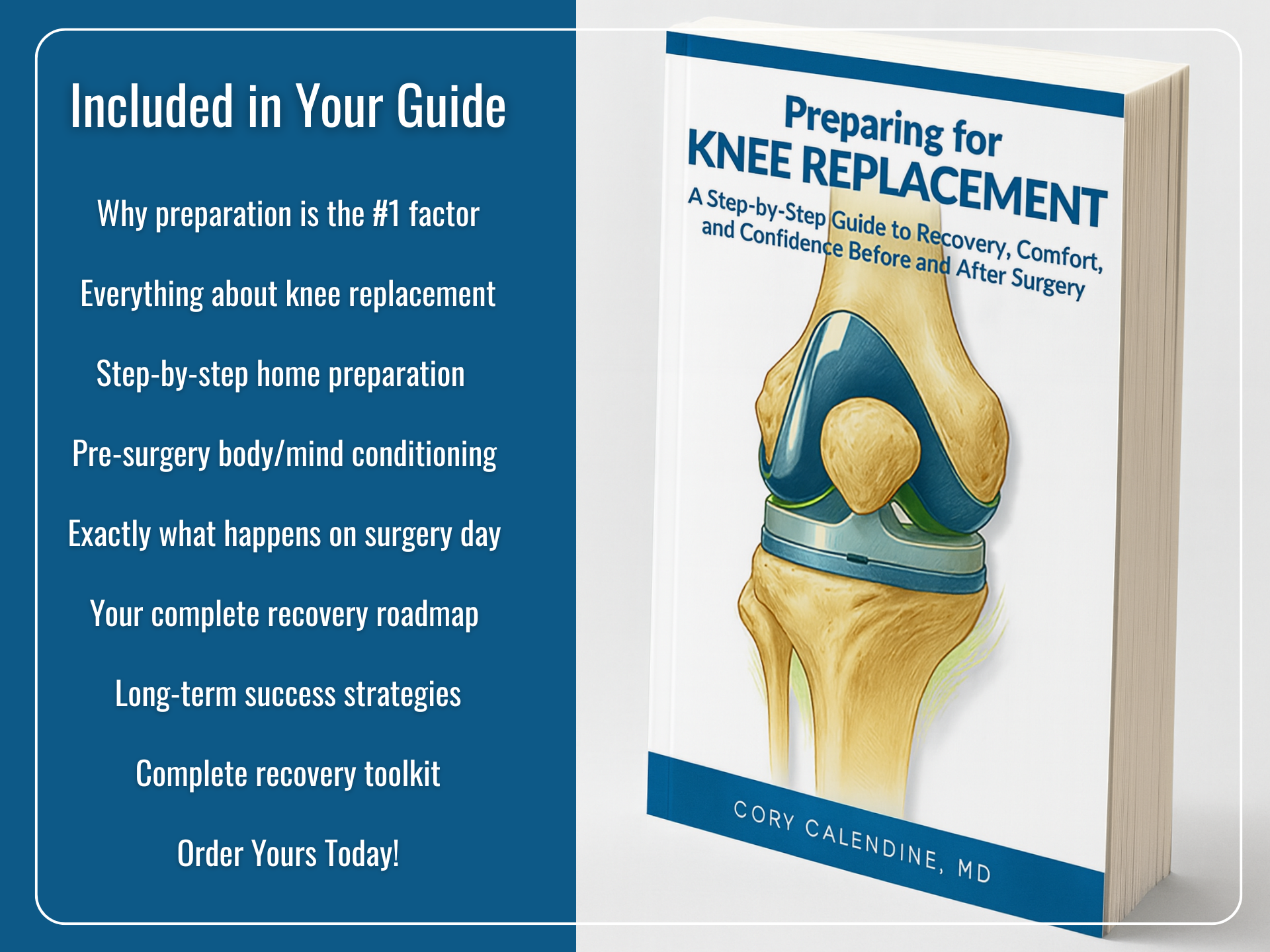Get Your Complete Knee Surgery Recovery Kit
Access the same preparation tools and recovery resources that help my patients achieve faster healing and better outcomes after knee replacement surgery. Motion is life, and life is motion. Get the proven resources that have helped thousands of patients prepare for successful knee replacement surgery and recover faster.

What's Included in Your Knee Surgery Recovery guide?
- ✓ Complete Preparation Checklist - Everything you need to do before surgery
- ✓ Pain Management Strategies - Advanced techniques for comfort during healing
- ✓ Home Safety Setup Guide - Make your home recovery-ready with specific tips
- ✓ Nutrition Guidelines - Foods that promote healing and reduce inflammation
- ✓ Timeline Expectations - Know what to expect week by week
- ✓ Emergency Contact Templates - Organized resources for peace of mind
About Dr. Cory Calendine - Your Trusted Knee Replacement Specialist
Dr. Cory Calendine is a board-certified orthopedic surgeon specializing exclusively in hip and knee replacement surgery. With over a decade of experience, Dr. Calendine has helped thousands of patients return to active, pain-free lives through advanced surgical techniques and comprehensive patient care.
Key Credentials:
Specializations:
- Robotic-assisted joint replacement surgery
- Minimally-invasive SubV Approach surgical techniques
- Outpatient & Same-day discharge protocols
- Complex joint replacement revision procedures
- Advanced pain management optimization
WHY Preparation Leads to Better Knee Replacement
The most successful joint replacement patients are those who understand their journey and actively participate in their recovery. When patients know what to expect and how to prepare, they approach surgery with confidence rather than anxiety. This preparation directly translates into better outcomes and faster recovery.
Key Benefits of Preparation:
- Reduced surgery anxiety and stress
- Faster post-operative recovery
- Better pain management
- Improved long-term outcomes
- Higher patient satisfaction
- Shorter hospital stays
- Reduced complications
Get the Complete Guide That Started It All
.png)
Based on Dr. Calendine's extensive clinical experience and thousands of patient interactions, 'Preparing for Knee Replacement' addresses the real concerns and questions patients face. This comprehensive guide empowers you to approach your surgery with confidence and achieve the best possible results.
Frequently Asked Questions
- What format are the resources in? Downloadable ebook with internal links to interactive tools and videos.
- Do I need to be Dr. Calendine's patient to use these resources? No, these resources are valuable for anyone considering or preparing for knee replacement surgery.
- How long do I have access to the materials? Forever. Download and keep them for your reference.
- Will I receive marketing emails? You'll receive the recovery kit immediately, plus occasional helpful tips about knee health. You can unsubscribe anytime.
Additional Knee Replacement Resources
Schedule Your Knee Replacement Consultation
Ready to take the next step toward pain-free mobility? Dr. Cory Calendine welcomes new patients seeking expert care for knee replacement surgery. As a board-certified orthopedic surgeon specializing exclusively in hip and knee replacement procedures, Dr. Calendine provides comprehensive treatment options including total knee replacement, partial knee replacement, robotic-assisted surgery, and minimally invasive techniques. With over a decade of experience helping thousands of patients return to active lifestyles, Dr. Calendine offers same-day discharge protocols, advanced pain management, and personalized treatment plans tailored to your specific needs and goals.
New patients are welcome for consultations, second opinions, and comprehensive knee evaluations. During your consultation, Dr. Calendine will review your medical history, discuss your symptoms and activity goals, and explain your treatment options using the same patient education approach featured in his book "Preparing for Knee Replacement." Whether you're considering surgery or exploring non-surgical alternatives, Dr. Calendine believes that informed patients make the best decisions about their care and achieve superior outcomes.
Contact Options:
Schedule Your Consult with Dr. calendine Today
Serving patients throughout Brentwood, Franklin and Greater Nashville area with advanced knee replacement surgery and comprehensive orthopedic care. Dr. Calendine accepts most major insurance plans and welcomes patients seeking second opinions about their knee replacement options.
Cory Calendine, MD is an Orthopedic Surgeon and founding partner of the Bone and Joint Institute of Tennessee at Williamson County Hospital in Franklin, TN. Dr. Calendine is an expert in Joint Replacement, specializing in Hip and Knee Surgery. From diagnosis through treatment, the Orthopedic Surgical experts at the Bone and Joint Institute use the latest techniques and technology to improve care for people with musculoskeletal problems. For more information, please contact our office or schedule your appointment today.


.png)